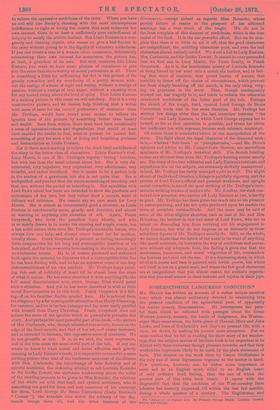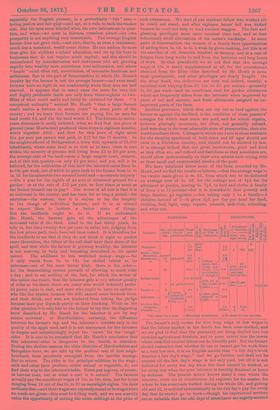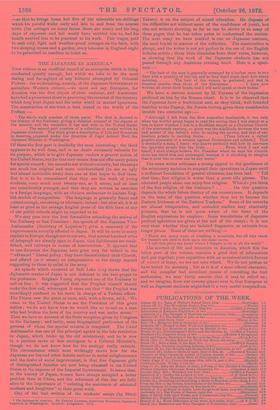SOMERSETSHIRE LABOURERS' CONDITION.*
MR. HEATH has written an account of a rather unique vacation tour, which was almost exclusively devoted to examining into the present condition of the agricultural poor, of apparently his native county, Somersetshire. He intersperses the pain- ful facts which he collected with passages about the Great Western journey, scenery, the battle of Sedgemoor, the Weston- super-Mare sanatorium, the birth-place of Hannah More and John Locke, and lines of Goldsmith's and Gay's on peasant life, with a view, no doubt, to making his journal more attractive. But we must confess that we felt in reading the short story of his wander- ings that the subject-matter of his little book is too important to be diluted with these irrelevant though pleasant remarks, and that they weaken the impression likely to be made by the plain statement of facts. The chapter on the work done by Canon Girdlestona is the only one of these digressions cognate to the matter in hand. Few questions, however, can be either more important or more sad to an English mind, allied to an English heart of only ordinary kind feeling, than the one of which the greater part of this little book treats. It opens with the disgraceful fact that the condition of the West-country farm labourer has scarcely improved, till within the last few months, during a whole quarter of a century. The Englishman, and Tlu Romance" of Peasant Life. By Francis George Heath. London: Cassell, Fetter, and Galpin. especially the English yeoman, is a proverbially " fair " man— loving justice and fair-play—and apt, as a rule, to back the weaker side. But his eyes seem blinded when his own interests are in ques- tion, and when—we must in fairness ourselves admit—his own prosperity is not anything very remarkable. The average English farmer does not grow rich,—not rich, that is, as even a tradesman, much less a merchant, would count riches. He can seldom do more than give his children a school education, and set up his boys in businesses that do not require much capital ; and this should be remembered by manufacturers and merchants who are growing rapidly into wealthy men, sometimes into millionaires, and whose " hands " could often tell, nevertheless, of miserable hardness and selfishness. But in the part of Somersetshire in which Mr. Heath's inquiry lay the farmer is not the average farmer—and even small farmers have no right to eat comfortably while their men are half starved. It appears that in many cases the rents for very rich and highly- profitable lands are only from three-eighths to two- fifths of what could easily and fairly be obtained for them. "A competent authority" assured Mr. Heath "that a large farmer could realise a fortune in seven years" in some parts of the county ; and we learn that farmers are paying 30s. an acre for land worth £4, and 40s. for land worth £5. The fortune-in-seven- years statement is easily believed, when we find that one piece of ground (near Montaeute) produced three crops in eighteen months, worth together £202; and that for this piece of eight acres 45s. per acre per annum was paid, or £27 for the 18 months. In the neighbourhood of Bridgewater, a town with upwards of 12,000 inhabitants, where some land is so rich as to have risen in rent within the memory of persons still living from £2 to £6 per acre, the average rent of the land—near a large seaport town, observe, and of this rich quality—is only £3 per acre: and yet, will it be believed, for the cultivation of this land the labourer earns from 9s. to 10s. per week, out of which he pays back to the farmer from is. to is. 6d. for his miserable two-roomed hovel and—monstrous iniquity ! —30s. a year for the eighth of an acre of allotment ground for a garden ; or at the rate of £12 per year, or four times as much as the farmer himself has to pay ? The worst of all this is that it is so universal in the county, and has been for so long a period—for centuries—the custom, that it is unjust to lay the iniquity to the charge of individual farmers, and it is as absurd to expect them to initiate a better state of things. But the landlords ought to do it. If we understand Mr. Heath, the farmers gain all the advantages of the increased value of the land. Land in the last thirty years, he tells us, has risen twenty-five per cent. in value, but, judging from the low prices paid, rents have not been raised. It is therefore for the landlords to see that if they do not think it right to pocket more themselves, the tillers of the soil shall have their share of the spoil, and that while the farmer is growing wealthy, the labourer is not starving in body and becoming brutalised in his moral nature. The additions to this wretched money - wage — for it only varies from 7s. to 12s. for skilled labour as its extremes—are of the most trivial kind; there is the cider— for the demoralising system prevails of allowing so much cider a day ; and to say nothing of the fact, for which the 6vriter of this notice can vouch, that the labourer gets a very inferior quality of cider as his share, there are many who would infinitely prefer its paltry value in cash, and more who ought to have no option— who like the system because the wife cannot come between them and their drink, and who are hindered from taking the pledge because their pay depends partly on their drinking. While on the cider question it is only fair to the farmer to say that the disgusting brew described by Mr. Heath for the labourer is not by any means universal ; in Herefordshire, certainly, the difference between the farmer's tap and the labourer's consists only in the quality of the apple used, and it is not uncommon for the labourer to despise and unhesitatingly reject the ' sweet ' for the 'rough' cider. It is also to be remarked that Mr. Heath's conclusion that this labourers'-oider is dangerous to the health, is mistaken. During the cholera seasons the cider districts of Herefordshire and Shropshire have, we are told by the medical men of that neigh- bourhood, been peculiarly exempted from the terrible scourge. But to return. The cider is the principal addition to the wage ; milk and other farm produce, either animal or vegetable, do not find their way to the labourer's table. Extra pay is given, of course, at harvest time, but at what a cost is it earned ! The farmers actually pay-the munificent wages of 15s. to 18s. then, but for hours ranging from 18 ont of the 24, to 20 on moonlight nights. On their ordinary diet—and these wages are expresslystated to be wages when no meals are given—this must be killing work, and we can scarcely value the opportunity of netting the extra shillings at the price of such exhaustion. We read of one stalwart fellow who worked tilt he could not stand, and after eighteen hours' toil was kicked because he could not help to load another waggon. The fuel and gleaning privileges seem more nominal than real, and at best ridiculously small alleviations of the cotter's hardships. In some parts of Somersetshire the women of a family have opportunities of adding from ls. 6d. to 4s. a week by glove-making, but this is at the sacrifice of all domestic comfort or decency, and at a cost of fatigue from long walks to and from the factories and long hours of work. So that practically we do not find that this average wage of 10s. is really supplemented at all, for the nourishment obtained from the filthy cider described by Mr. Heath is more than questionable, and other privileges are dearly bought. On the other hand, the deductions are very real indeed, namely, a universal rent varying from £2 12s. to £5 per annum—generally Is. 6d. per week—and an exorbitant rent for garden allotments which are frequently taken from the labourer when improved by years of toil and manure, and fresh allotments assigned ou un- improved parts of the farm.
Another grievance, which does not cry out so loud against the farmer as against the landlord, is the condition of these peasants' cottages for which such rents are paid, and for which repairs, however glaringly necessary, are often, nay generally refused. And were they in the most admirable state of preservation, theiesize would condemn them. Cottages in which one room is alone available for the sleeping apartment of both sexes and all ages should not exist in a Christian country, and should not be allowed by law. It is strange indeed that our great landowners, good and kind as they often are, and refined and fastidious as they sometimes are, should allow systematically on their own estates such crying evils as these small and overcrowded abodes of the poor.
We have tabulated below some of the facts recorded by Mr. Heath, and we find the results as follows,—that the average wage in the twelve cases given is Ss. 6d., from which has to be deducted an average rent of is. 6d. for the cottage and of 40. for the allotment or garden, leaving 6s. 70. to feed and clothe a family of from 4 to 14 persons—for it is remarkable that poverty and large families go together ;—but taking only 5 to a family children instead of 7—it gives 20. per day per head for food, clothing, fuel, light, soap, repairs, utensils, sick-club, schooling, and what not.
EARNINGS. DEDUCTIONS.
Locality.
No. of child- ren,
Age and sex of children
Wage per week.
Cider to I Father.
Earnings of Wife & Children. m q! 1.:::',1 ... is o 8 (i ; — acre age.
Allotment or Garden. I V d ''' a
bors f4 . , is -g 0
P)
g 11 .5
_
per week.
Wrington — Stoke - Sub- Herndon liontacute — — Bridgewater - Taunton Athelney Stoke-St - Gregory Dunster seveel 10 0 10
C
2 8 6 Idest16 all girls Isliddersi:,112 audbaby boy s.
7/0
5/0
8/0 9/0 10/0 10/0 9tolOSto4 to9/6 9/0 9/0
9/0 6/ to 9/ puts per day.
3 3 81 - 3 i trifling ...
extra ear- uings per week, 1/0 to 4/0,wife & daugh's wife 84. a day, some- eldest girl earned a trifle ...... 1/6 1/0 1/6 1/# 1/3* 1/0 I 1 to1/6 1/0 .1 1/9 2/0t
1/8 Free..
1 will pots eno for 3 sma
dee } i
aid.
id. grow toes ugh m'ths.
I gar- lOid 84. d. Sid. d d 2d1 * No meat for a year. t Herrings sometimes t No mos for six months.
The farmer's only excuse for this long reign of low wages is that the labour market in the South has been over-stocked, and we are glad to find that the peasantry are being drafted into less crowded agricultural districts, and to some extent into the towns where unskilled manual labour can be liberally paid. But the farmer should remember that whether he can or cannot get his work done- at a very low rate, it is an English maxim that "a fair day's work deserves a fair day's wage;" and we go further, and shall not be- content till the fair day's wage is not only paid, but till it is not deducted for every wet day when the land cannot be worked, or- for every day when the poor labourer is forcibly detained at home- by sickness. The present writer knows many a case where the labourer, worn out in constitution by exposure for his muter, for whom he has sometimes worked during his whole life, and getting old and ill, is mulcted systematically in the full day's pay for every day that he cannot go to work—though his experienced services are so valuable that the odd days of attendance are eagerly/4mnd
—so that he brings home but five of the miserable ten shillings which his painful walks early and late to and from the nearest town (for cottages on many farms there are none) and his long -days of exposure and toil would have entitled him to, had his health enabled him to be punctual at his work. Fair wages, paid in cash only, light and weather-proof cottages on the farm, with two sleeping-rooms and a garden, every labourer in England ought to be permitted to combine to insist on.




































 Previous page
Previous page